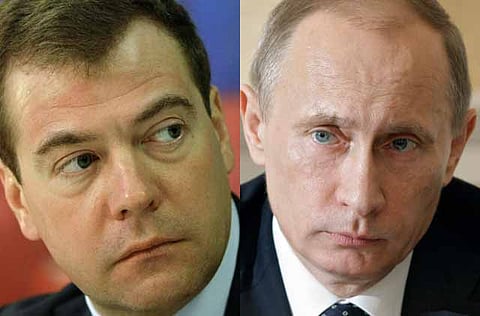Medvedev versus Putin
The Russian president has repudiated key tenets of Putinism, but the prime minister is ignoring him

The security of the United States continues to be tied to decisions in Moscow, as evidenced by US President Barack Obama's touting of the pending strategic arms-control agreement with Russia in his State of the Union address. And those decisions, in turn, will hinge on Russian domestic politics. The central question is whether Russian President Dmitry Medvedev's increasingly radical rhetoric will begin to translate into policies that would spell a decisive break with those of his predecessor, current Prime Minister Vladimir Putin.
Could 2010 become Medvedev's equivalent of Mikhail Gorbachev's 1987 — the year when, also after only two years in the Kremlin and against very strong opposition by hard-liners, Gorbachev began lifting totalitarian controls over politics by declaring glasnost and democratisation?
Like Gorbachev in 1987, Medvedev faces tough odds. His speeches are still contaminated by the bluster and outright propaganda lies of Putinism. Moreover, unlike Gorbachev — who had the awesome power of the office of the Communist Party's general secretary — Medvedev's authority still appears to be on loan from Putin.
Critique
And yet, just as unmistakably, in the last few months, Russia's president has not only dissociated himself from key tenets of Putinism but challenged and repudiated them, in effect chipping away at the legitimacy of the political and economic order he inherited. Medvedev's critique was especially pointed and concentrated in his September article, Rossiya, vperyod! (‘Russia, forward!'), posted on the opposition web daily Gazeta.ru.
Medvedev described the Russian economy as "chronically backward," "primitive" and dependent on raw-materials exports. The system "largely ignores" the needs of people, while businesses are averse to inventing or manufacturing things and, instead, trade in commodities and imported goods. The competitiveness of Russian-made goods in world markets is "shamefully" low. Labour productivity is meagre as well, as is the quality of "half-Soviet" social services.
Corruption is ubiquitous, Medvedev goes on to say, and people are all but defenceless against "arbitrariness, non-freedom and the disdain" for the law and the courts that corruption breeds. The wide-spread "paternalistic sentiments" result in a lack of initiative and a dearth of new ideas in an "archaic society" where the "bigwigs" think and decide for everyone.
Medvedev also has called for an end of the era of "petulance, haughtiness, the inferiority complex, mistrust and hostility" in relations with leading democracies, and advocates reversing Russia's confrontation and self-isolation.
Yet the Russian president's most portentous, if little noticed, rhetorical break with Putinism goes to the issue of modernisation. His statements amount to a rejection of Putin's choices. First, he wrote that oil and gas, in effect, cannot be the cornerstones and engines of lasting prosperity and progress. A truly great modern state cannot be built on petrodollars. Instead, Medvedev reiterated in the November speech, Russia must develop an "intelligent," knowledge-based economy.
The most damaging legacy of Putinism has been the pervasive cynicism born of daily powerlessness amid lies, corruption and cruelty. Thus, Medvedev's deeds must match his words.
What might some Medvedev deeds include? Gorbachev began by releasing Andrei Sakharov from exile in Gorky in December 1986. Medvedev's equivalents might include an unconditional pardon for the former leading Russian entrepreneur Mikhail Khodorkovsky, who is facing a kangaroo court's sentence of up to 22 years in jail. The murderers of the opposition journalist Anna Politkovskaya in 2006 also need to be brought to justice.
Investigations
There should be an investigation of the shamelessly fraudulent local "elections" in October; a follow-up on the promise made in the state-of-Russia speech to audit (and eventually privatise) state corporations — created by Putin with Gazprom and Rosneft as his models, and widely believed to be hubs of corruption and mismanagement. Medvedev should, at long last, conduct a credible and full investigation into the 1999 apartment bombings that critics allege were engineered by the secret services to justify the invasion of Chechnya and boost Putin's popularity.
And perhaps most important, he should relax and eventually abolish the Kremlin censorship of television, enabling Russians to learn the truth about the real state of affairs.
If Medvedev is indeed determined to follow in Gorbachev's footsteps, his rhetoric must be a prologue to actions. In 2010, his glasnost must be followed by perestroika policies — or he will fade into irrelevance.
Leon Aron, resident scholar and director of Russian studies at the American Enterprise Institute, is the author, most recently, of Russia's Revolution: Essays 1989-2006.
Sign up for the Daily Briefing
Get the latest news and updates straight to your inbox


